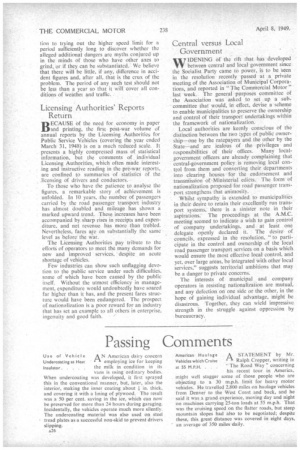Central versus Local Government W IDEN1NG of the rift that has
Page 2

If you've noticed an error in this article please click here to report it so we can fix it.
developed V V between central and local government since the Socialist Party came to power, is to be been in the resolution recently passed at a private meeting of the Association of Municipal Corporations, and reported in "The Commercial Motor" last week. The general purposes committee of the Association was asked to set up a sub, committee that would, in effect, devise a scheme to enable municipalities to preserve the ownership and control of their transport undertakings within the framework of nationalization. Local authorities are keenly conscious of the distinction between the two types of public ownership—one by the ratepayers and the other by the State—and are jealous of the privileges and responsibilities of their offices. Many localgovernment officers are already complaining that central-government policy is removing local control from them and converting their departments into clearing houses for the endorsement and transit-fission of ,Ministerial edicts. The form of nationalization proposed for road passenger transport strengthens that animosity. Whilst sympathy is extended to municipalities in their desire to retain their excellently run transport systems, there is •a sinister note in their aspirations. The proceedings at the A.M.C. meeting seemed to indicate a wish to gain control of company undertakings, and at least one delegate openly declared it. The desire of councils, expressed in the resolution, "to participate in the control and ownership of the local road passenger transpprt services on a basis which would ensure the most effective local control, and yet, over large areas, be integrated with other local services," suggests territorial ambitions that may be a danger to private concerns. The interests of municipal and company operators in resisting nationalization are mutual, and any defection on one side or the other, in the hope of gaining individual advantage, might be disastrous. Together, they can wield impressive strength in the struggle against oppression by bureaucracy..


























